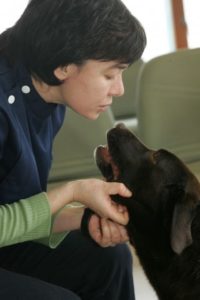
The Labrador Retriever could have key health concerns as well as major health issues. Examples of these health issues are cataracts, retinal dysplasia, progressive retinal atrophy, osteochondritis dissecans, hip and elbow dysplasia, gastric torsion, or muscular dystrophy.
Young dogs as well as adult dogs can develop cataracts. The presence of juvenile cataracts in young dogs is generally hereditary and can be diagnosed through an opthalmoscopic exam. Providing the health of the animal is good, cataracts can be surgically removed with very good results.
Retinal dysplasia is an abnormal development of the retina. Retina problems can usually be revealed with a retinoscopic examination.
Gradual deterioration of the retina is called progressive retinal atrophy. PRA can be diagnosed by a retinoscopic exam or by means of an electroretinogram. In the beginning stages of PRA the dog may become nightblind or lack the ability to see in dim light. During later stages, the affected dog is unable to see in daytime. If the environment of the animal remains constant as the vision deteriorates, the affected dog can adapt very well.
Canine hip dysplasia is a skeletal problem resulting in abnormal development of the hip joint that prevents the femur from fitting into the pelvic socket. CHD can exist with or without clinical signs. This malformation of the hip joint can cause the dog pain in one or both rear legs. Elbow dysplasia is perhaps due to improper development of the three elbow bones. Both hip and elbow dysplasia can result in painful arthritis.
Fast growing, young dogs, usually six to nine months of age that belong to the larger lab breeds can sometimes develop osteochondritis dissecans. OCD is a degeneration of bone underlying the cartilage layer of joints. OCD can affect elbow or ankle joints as well as the shoulder. If the dog is overweight, this could be a contributing factor along with physical impacts such as jumping off of high objects. OCD can be very painful causing the dog to limp, become lame or even develop arthritis. Several suggestions for relief would include controlling diet, complete rest and limited playtime activities. If symptoms continue, surgical removal of torn away cartilage pieces is another effective treatment.

Large, deep chested breeds can develop a condition called Gastric Torsion or Bloat (Gastric dilatation volvulus GDV). GDV is caused by a twisting of the stomach causing contents and gases to be trapped in the stomach. Pain is caused from the rapid swelling of the abdomen and if left untreated can result in death. Persons owning a deep chested breed should be aware of the exact emergency procedures for gastric torsion from a veterinary hospital.
Muscular Dystophy is another condition involving progressive degeneration of skeletal muscles. ARMD is not usually fatal and can be identified through a blood test, electromyography or muscular biopsies.
When considering a Labrador breed of dog, check out reputable breed clubs with a code of ethics. While there is no guarantee for a perfect animal, these diseases can be brought under control by testing and clear breeding practices.












[…] George has been submitted to the competition before, always losing out to Titan, another large dog pup that seemed to be nearly ¾ of an inch taller than Giant George. After some wrangling, Guinness […]
[…] George has been submitted to the competition before, always losing out to Titan, another large dog pup that seemed to be nearly ¾ of an inch taller than Giant George. After some wrangling, Guinness […]
[…] these basic warning indicators that can indicate illness in any animal, Labrador Retrievers may present special signs and symptoms which might set off alarm bells that only the Lab owner would recognize as unusual […]
[…] the infected ear against furniture or the floor regularly. If you notice either of these symptoms, you should bring your pet into the vet to determine if an allergy is the underlying […]